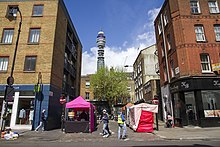Goodge Place Market
 | |
| Location | Fitzrovia, Camden, Greater London |
|---|---|
| Coordinates | 51°31′09″N 0°08′11″W / 51.519275°N 0.136298°WCoordinates: 51°31′09″N 0°08′11″W / 51.519275°N 0.136298°W |
| Address | Goodge Place |
| Opening date | 1850 |
| Management | Camden London Borough Council |
| Owner | Camden London Borough Council |
| Environment | Outdoor |
| Goods sold | Street food |
| Days normally open | Monday to Friday |
| Website | camden.gov.uk/markets |
Goodge Place Market is an outdoor street market in Camden, North London. Licences to trade are issued by Camden London Borough Council.
History[]
Early history (1850–1867)[]
Originally the market occupied Charles Street (now the stretch of Goodge Street between Charlotte Street and Newman Street.[1] Goodge Place, like Goodge Street, is named for Francis and William Goodge who in 1766 began developing Goodge Street as a shopping street.[2]
Unregulated street markets allowed London to grow explosively in the late nineteenth and early twentieth century. The traders could move easily to the new population centres and enabled people to buy provisions without having to travel to the central London wholesale markets. In the early morning traders would load their barrows at the wholesale markets, clean and sort the goods, and then sell them in the new suburban streets. In many cases, the sites of these markets became London's modern high streets.
Management by the police (1867–1927)[]
In 1878 Walford writes that the market was on the south-side of the street and busiest on Friday and Saturday evenings (when most people were paid), He states that it is one of the last street markets remaining in the West End of London and shows little hope that it will persist.[3]
In 1867, section six of the Metropolitan Streets Act effectively prohibited street trading. Following public meetings and press criticism, the act was amended within weeks. Section one of the Metropolitan Streets Act Amendment Act 1867 exempted traders but they were now subject to regulation by the police.[4]
Fifteen years later the market is described as consisting of 45 stalls and having been established in around 1850.[5] The same report describes the market as being a general market selling food, homewares, flowers, and books.
Management by local councils (1927–present)[]
The London County Council (General Powers) Act 1927 replaced police regulation with a new licensing regime administered by metropolitan borough councils.[6] From 1927 to 1965 the market was managed by the Metropolitan Borough of St Pancras.
In 1965 the Borough of St Pancras was abolished and its area became part of the London Borough of Camden.
By 1983 the market had relocated to Goodge Place and Perlmutter describes a small Monday to Saturday market out of keeping with the multinational variety of goods available in the area.[7]
In the 2000s the market followed the trends of the area and consisted of five international street-food stalls selling food from around the world and serving the Monday to Friday lunch crowds.
Transport[]
Bus[]
Bus Routes 24, 29, 73, and 390.
Railway and tube[]
The nearest stations are Goodge Street, Tottenham Court Road, and Warren Street.
References[]
- ^ Ordnance Survey (1872). Survey of London (Map) (First ed.). 1:1056. London: Ordnance Survey. p. Middlesex XVII. Retrieved 16 July 2020.
- ^ Camden History Society (2020). Camden Street Names and their origins (PDF) (Report). London: Camden History Society. p. 46. Retrieved 2020-09-24.
- ^ Walford, Edward (1878). "XXXV". Old and New London:. IV (1st ed.). London: Cassell, Petter & Galpin. ISBN 978-1-4456-2204-0. Retrieved 20 July 2020.
- ^ Metropolitan Streets Act Amendment Act 1867 (section one)]. London: HMSO. 1867.
- ^ Public Control Committee (1893). "Appendix B". London Markets, Special Report of the Public Control Committee Relative to Existing Markets and Market Rights and as to the Expediency of Establishing New Markets in or Near the Administrative County of London (Report). London: London County Council. p. 41.
- ^ Kelley, Victoria (2019). Cheap Street: London’s Street Markets and the Cultures of Informality, c. 1850–1939. Manchester: Manchester University Press. p. 39.
- ^ Perlmutter, Kevin (1983). London Street Markets (1st ed.). Worcester: Billing & Sons. p. 55. ISBN 0-7045-0462-6.
External links[]
- camden.gov.uk/markets—Camden Council's markets webpages
- Goodge Place Market—National Market Traders Federation
- Tourist attractions in the London Borough of Camden
- 19th-century establishments in England
- Retail markets in London
- Fitzrovia
- Commerce stubs

